牛津译林版(2019)必修 第二册Unit 2 Be sporty,be healthy -Extended Reading课件(共28张PPT)
文档属性
| 名称 | 牛津译林版(2019)必修 第二册Unit 2 Be sporty,be healthy -Extended Reading课件(共28张PPT) |  | |
| 格式 | pptx | ||
| 文件大小 | 2.5MB | ||
| 资源类型 | 教案 | ||
| 版本资源 | 牛津译林版(2019) | ||
| 科目 | 英语 | ||
| 更新时间 | 2023-10-22 14:55:29 | ||
图片预览



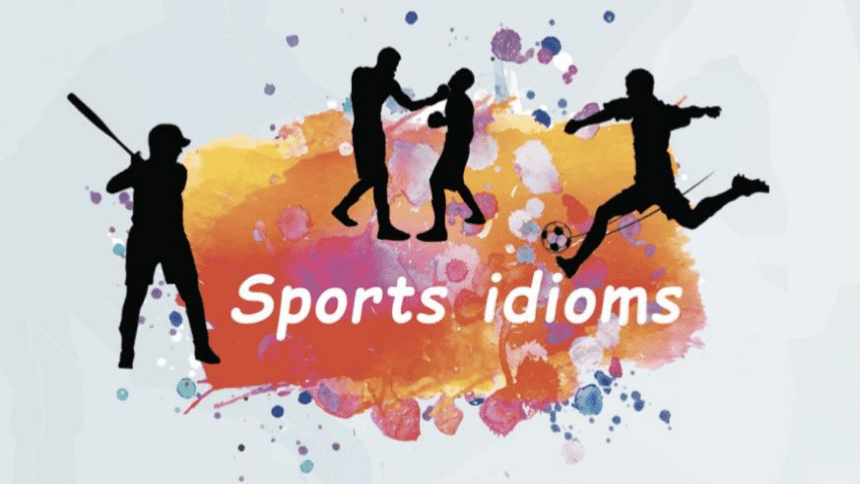

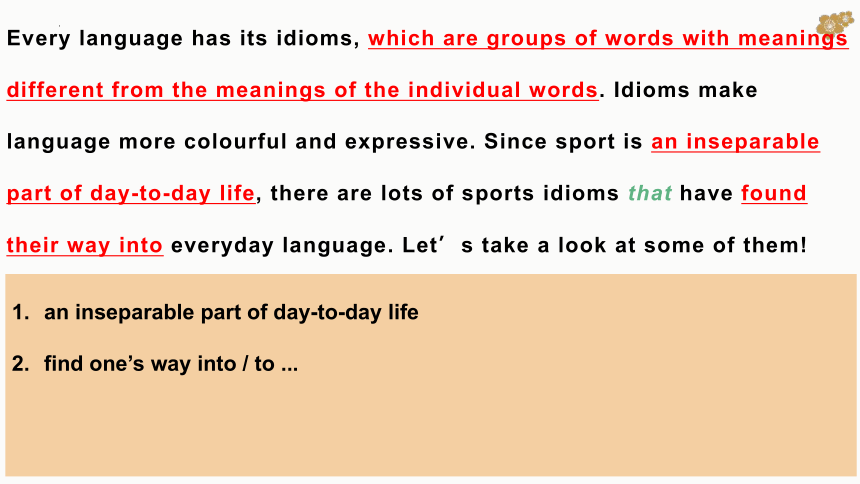
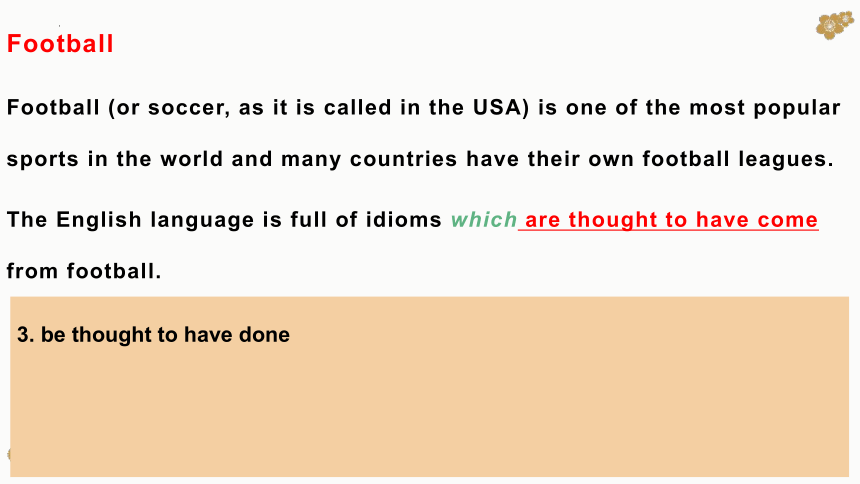
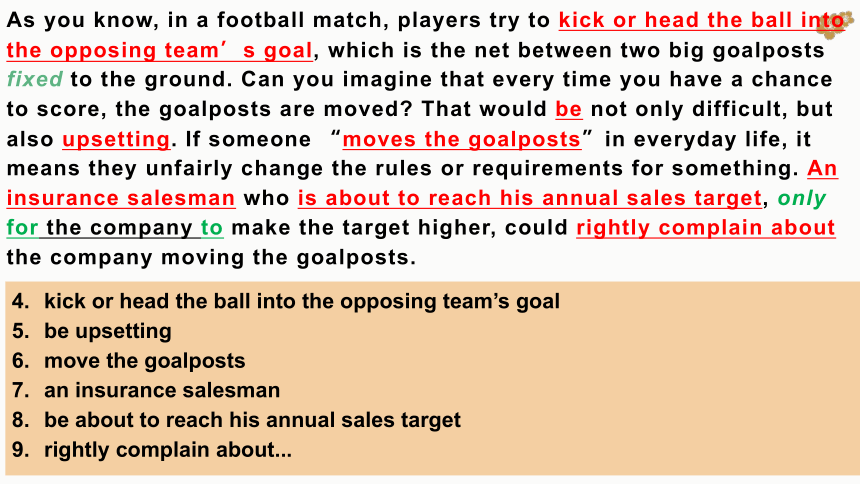
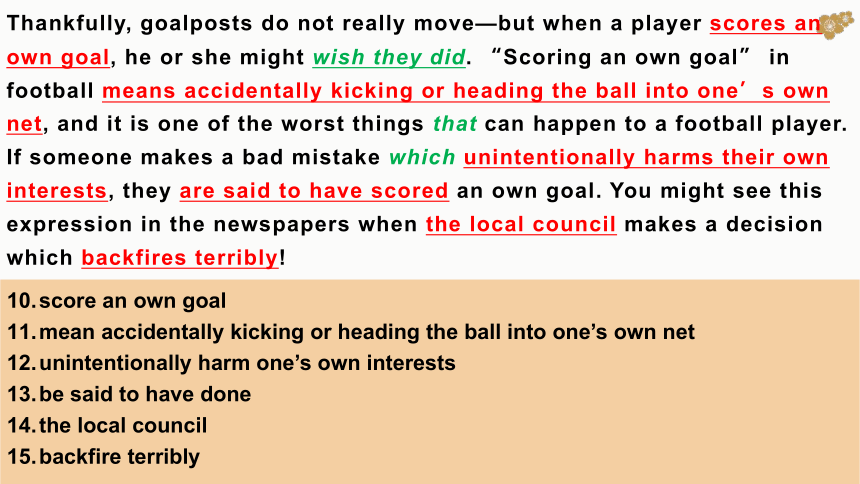
文档简介
(共28张PPT)
Extended reading
Let’s discuss some idioms!
一石二鸟一箭双雕一举两得
赠马不看牙;
不要对别人送的礼物挑三拣四
Let’s discuss some idioms!
下倾盆大雨
非常冷静,泰然自若
Ⅰ
Language Ponints
Every language has its idioms, which are groups of words with meanings different from the meanings of the individual words. Idioms make language more colourful and expressive. Since sport is an inseparable part of day-to-day life, there are lots of sports idioms that have found their way into everyday language. Let’s take a look at some of them!
an inseparable part of day-to-day life
find one’s way into / to ...
Football
Football (or soccer, as it is called in the USA) is one of the most popular sports in the world and many countries have their own football leagues.
The English language is full of idioms which are thought to have come from football.
3. be thought to have done
As you know, in a football match, players try to kick or head the ball into the opposing team’s goal, which is the net between two big goalposts fixed to the ground. Can you imagine that every time you have a chance to score, the goalposts are moved That would be not only difficult, but also upsetting. If someone “moves the goalposts”in everyday life, it means they unfairly change the rules or requirements for something. An insurance salesman who is about to reach his annual sales target, only for the company to make the target higher, could rightly complain about the company moving the goalposts.
kick or head the ball into the opposing team’s goal
be upsetting
move the goalposts
an insurance salesman
be about to reach his annual sales target
rightly complain about...
Thankfully, goalposts do not really move—but when a player scores an own goal, he or she might wish they did. “Scoring an own goal” in football means accidentally kicking or heading the ball into one’s own net, and it is one of the worst things that can happen to a football player. If someone makes a bad mistake which unintentionally harms their own interests, they are said to have scored an own goal. You might see this expression in the newspapers when the local council makes a decision which backfires terribly!
score an own goal
mean accidentally kicking or heading the ball into one’s own net
unintentionally harm one’s own interests
be said to have done
the local council
backfire terribly
Baseball
Baseball is an old and popular sport that has given the English language many different idioms. You might have heard expressions like “in the ballpark”or “a ballpark estimate”. The venue where a baseball game is played is called a ballpark. So, even if we do not know exactly where the ball is during the game, we can assume that it is somewhere in the ballpark. For this reason, people use the expression“in the ballpark” or “a ballpark estimate” to talk about rough estimates.
might have done
in the ballpark
a ballpark estimte
for this reason
rough estimates
Another common baseball expression is “throwing someone a curveball”. Curveballs are balls that suddenly turn in the air, and these are of course difficult for the other team to handle. We use this expression to describe things that are unexpected and difficult to respond to. “Three strikes and you are out” is another idiom that comes from baseball. As it suggests, in baseball this means that a batter (the person with the baseball bat in his or her hands) is out after making three unsuccessful attempts to hit the ball. This idiom is often used to talk about situations where people fail after wasting three chances.
throw someone a curveball
respond to
three strikes and you are out
as it suggests
the baseball bat
make three unsuccessful attempts
hit the ball
Boxing
English also has a large number of idioms connected with boxing, which has been a popular sport for thousands of years. A boxer is not allowed to use his or her fists to hit the opponent below the waist. Hence comes the idiom “below the belt”. In day-to-day life, if someone makes an unfair and cruel remark, we can describe it as“below the belt”.
a large number of idioms
below the waist
below the belt
make an unfair and cruel remark
describe ... as...
“Throwing in the towel” is another common idiom that comes from boxing. When a boxer is losing badly and is too tired or confused to give up on his or her own, the coach will literally throw a towel into the ring to end the fight. In everyday life, this idiom simply means admitting defeat and giving up.
throw in the towel
on one’s own
throw a towel into the ring
Sport is challenging and so is life. However, when you are thrown a curveball, do not throw in the towel—work hard, be careful not to score an own goal, and you are sure to make it!
make it
Extended reading (phrases and difficult sentences)
Every language has its idioms, which are groups of words with meanings different from the meanings of the individual words.
an inseparable part of day-to-day life
find one’s way into / to ...
be thought to have done
kick or head the ball into the opposing team’s goal
be upsetting
move the goalposts
an insurance salesman
be about to reach his annual sales target
rightly complain about...
Extended reading
score an own goal
mean accidentally kicking or heading the ball into one’s own net
unintentionally harm one’s own interests
be said to have done
the local council
backfire terribly
might have done
in the ballpark
a ballpark estimte
for this reason
rough estimates
Extended reading
throw someone a curveball
respond to
three strikes and you are out
as it suggests
the baseball bat
make three unsuccessful attempts
hit the ball
a large number of idioms
below the waist
Extended reading
below the belt
make an unfair and cruel remark
describe ... as...
throw in the towel
on one’s own
throw a towel into the ring
make it
II
Fast reading
Read the article (P25-26) and fill in the following chart
There are lots of sports idioms that have found their way into everyday language.
move the goalposts; score an own goal
in the ballpark;
a ballpark estimate;
throw someone a curveball;
three strikes and you are out
below the belt;
throw in the towel
Intensive reading
III
What are the definition and function of idioms
Read carefully and answer questions
Para 1
Every language has its idioms, which are groups of words with meanings different from the meanings of the individual words. Idioms make language more colourful and expressive. Since sport is an inseparable part of day-to-day life, there are lots of sports idioms that have found their way into everyday language. Let’s take a look at some of them!
Football idioms: fill in the following table
Para 2-4
Baseball idioms: fill in the following table
Para 5-6
Boxing idioms: fill in the following table
Para 7-8
Translate this paragraph into Chinese.
Read carefully and answer questions
Para 9
运动是有挑战性的,生活也是如此。然而,当你被刁难时,不要放弃——努力工作,小心不要自摆乌龙,那么你就一定能成功。
Sport is challenging and so is life. However, when you are thrown a curveball, do not throw in the towel—work hard, be careful not to score an own goal, and you are sure to make it!
What do you think of the last paragraph of the article
What do you think of the last paragraph of the article
Read carefully and answer questions
Para 9
I like the last paragraph because it connects some of the
idioms into one sentence in a humorous and meaningful
way.
Just like the function of idioms, the author also makes the
language of the article colourful and expressive.
What is the author’s purpose of introducing these
sports idioms
Read carefully and answer questions
I think the author aims to make readers aware of the
importance of sport and idioms. As she says in the
first paragraph, sport is an inseparable part of everyday
life, thus it is necessary to know more about it. Learning
that so many English idioms come from sport makes me
wonder what else we can learn from sport.
Extended reading
Let’s discuss some idioms!
一石二鸟一箭双雕一举两得
赠马不看牙;
不要对别人送的礼物挑三拣四
Let’s discuss some idioms!
下倾盆大雨
非常冷静,泰然自若
Ⅰ
Language Ponints
Every language has its idioms, which are groups of words with meanings different from the meanings of the individual words. Idioms make language more colourful and expressive. Since sport is an inseparable part of day-to-day life, there are lots of sports idioms that have found their way into everyday language. Let’s take a look at some of them!
an inseparable part of day-to-day life
find one’s way into / to ...
Football
Football (or soccer, as it is called in the USA) is one of the most popular sports in the world and many countries have their own football leagues.
The English language is full of idioms which are thought to have come from football.
3. be thought to have done
As you know, in a football match, players try to kick or head the ball into the opposing team’s goal, which is the net between two big goalposts fixed to the ground. Can you imagine that every time you have a chance to score, the goalposts are moved That would be not only difficult, but also upsetting. If someone “moves the goalposts”in everyday life, it means they unfairly change the rules or requirements for something. An insurance salesman who is about to reach his annual sales target, only for the company to make the target higher, could rightly complain about the company moving the goalposts.
kick or head the ball into the opposing team’s goal
be upsetting
move the goalposts
an insurance salesman
be about to reach his annual sales target
rightly complain about...
Thankfully, goalposts do not really move—but when a player scores an own goal, he or she might wish they did. “Scoring an own goal” in football means accidentally kicking or heading the ball into one’s own net, and it is one of the worst things that can happen to a football player. If someone makes a bad mistake which unintentionally harms their own interests, they are said to have scored an own goal. You might see this expression in the newspapers when the local council makes a decision which backfires terribly!
score an own goal
mean accidentally kicking or heading the ball into one’s own net
unintentionally harm one’s own interests
be said to have done
the local council
backfire terribly
Baseball
Baseball is an old and popular sport that has given the English language many different idioms. You might have heard expressions like “in the ballpark”or “a ballpark estimate”. The venue where a baseball game is played is called a ballpark. So, even if we do not know exactly where the ball is during the game, we can assume that it is somewhere in the ballpark. For this reason, people use the expression“in the ballpark” or “a ballpark estimate” to talk about rough estimates.
might have done
in the ballpark
a ballpark estimte
for this reason
rough estimates
Another common baseball expression is “throwing someone a curveball”. Curveballs are balls that suddenly turn in the air, and these are of course difficult for the other team to handle. We use this expression to describe things that are unexpected and difficult to respond to. “Three strikes and you are out” is another idiom that comes from baseball. As it suggests, in baseball this means that a batter (the person with the baseball bat in his or her hands) is out after making three unsuccessful attempts to hit the ball. This idiom is often used to talk about situations where people fail after wasting three chances.
throw someone a curveball
respond to
three strikes and you are out
as it suggests
the baseball bat
make three unsuccessful attempts
hit the ball
Boxing
English also has a large number of idioms connected with boxing, which has been a popular sport for thousands of years. A boxer is not allowed to use his or her fists to hit the opponent below the waist. Hence comes the idiom “below the belt”. In day-to-day life, if someone makes an unfair and cruel remark, we can describe it as“below the belt”.
a large number of idioms
below the waist
below the belt
make an unfair and cruel remark
describe ... as...
“Throwing in the towel” is another common idiom that comes from boxing. When a boxer is losing badly and is too tired or confused to give up on his or her own, the coach will literally throw a towel into the ring to end the fight. In everyday life, this idiom simply means admitting defeat and giving up.
throw in the towel
on one’s own
throw a towel into the ring
Sport is challenging and so is life. However, when you are thrown a curveball, do not throw in the towel—work hard, be careful not to score an own goal, and you are sure to make it!
make it
Extended reading (phrases and difficult sentences)
Every language has its idioms, which are groups of words with meanings different from the meanings of the individual words.
an inseparable part of day-to-day life
find one’s way into / to ...
be thought to have done
kick or head the ball into the opposing team’s goal
be upsetting
move the goalposts
an insurance salesman
be about to reach his annual sales target
rightly complain about...
Extended reading
score an own goal
mean accidentally kicking or heading the ball into one’s own net
unintentionally harm one’s own interests
be said to have done
the local council
backfire terribly
might have done
in the ballpark
a ballpark estimte
for this reason
rough estimates
Extended reading
throw someone a curveball
respond to
three strikes and you are out
as it suggests
the baseball bat
make three unsuccessful attempts
hit the ball
a large number of idioms
below the waist
Extended reading
below the belt
make an unfair and cruel remark
describe ... as...
throw in the towel
on one’s own
throw a towel into the ring
make it
II
Fast reading
Read the article (P25-26) and fill in the following chart
There are lots of sports idioms that have found their way into everyday language.
move the goalposts; score an own goal
in the ballpark;
a ballpark estimate;
throw someone a curveball;
three strikes and you are out
below the belt;
throw in the towel
Intensive reading
III
What are the definition and function of idioms
Read carefully and answer questions
Para 1
Every language has its idioms, which are groups of words with meanings different from the meanings of the individual words. Idioms make language more colourful and expressive. Since sport is an inseparable part of day-to-day life, there are lots of sports idioms that have found their way into everyday language. Let’s take a look at some of them!
Football idioms: fill in the following table
Para 2-4
Baseball idioms: fill in the following table
Para 5-6
Boxing idioms: fill in the following table
Para 7-8
Translate this paragraph into Chinese.
Read carefully and answer questions
Para 9
运动是有挑战性的,生活也是如此。然而,当你被刁难时,不要放弃——努力工作,小心不要自摆乌龙,那么你就一定能成功。
Sport is challenging and so is life. However, when you are thrown a curveball, do not throw in the towel—work hard, be careful not to score an own goal, and you are sure to make it!
What do you think of the last paragraph of the article
What do you think of the last paragraph of the article
Read carefully and answer questions
Para 9
I like the last paragraph because it connects some of the
idioms into one sentence in a humorous and meaningful
way.
Just like the function of idioms, the author also makes the
language of the article colourful and expressive.
What is the author’s purpose of introducing these
sports idioms
Read carefully and answer questions
I think the author aims to make readers aware of the
importance of sport and idioms. As she says in the
first paragraph, sport is an inseparable part of everyday
life, thus it is necessary to know more about it. Learning
that so many English idioms come from sport makes me
wonder what else we can learn from sport.
